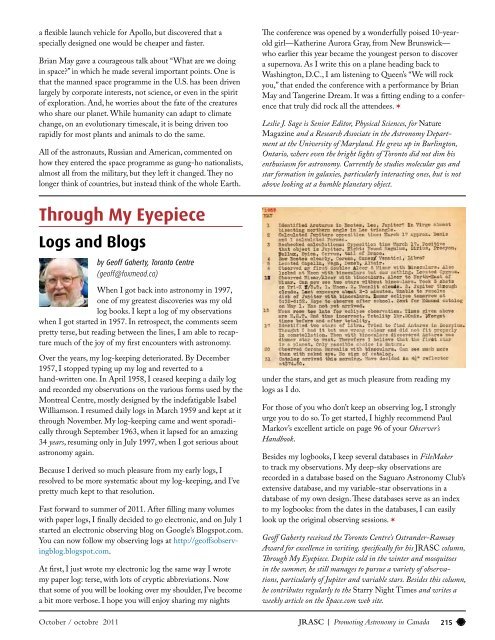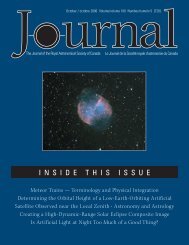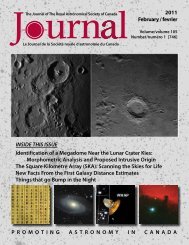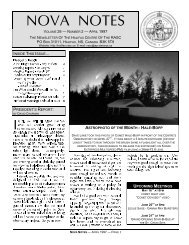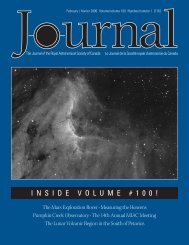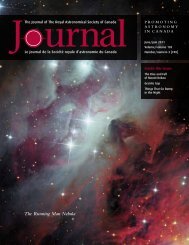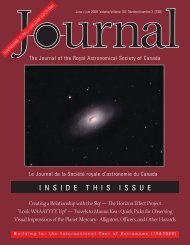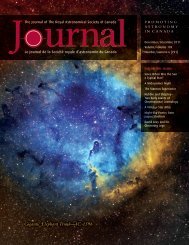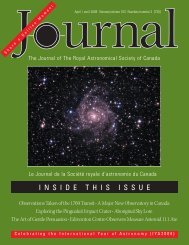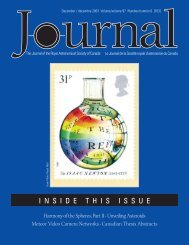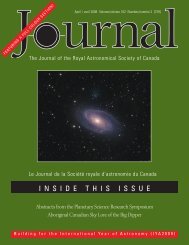The stunning Orion Nebula - The Royal Astronomical Society of ...
The stunning Orion Nebula - The Royal Astronomical Society of ...
The stunning Orion Nebula - The Royal Astronomical Society of ...
You also want an ePaper? Increase the reach of your titles
YUMPU automatically turns print PDFs into web optimized ePapers that Google loves.
a flexible launch vehicle for Apollo, but discovered that a<br />
specially designed one would be cheaper and faster.<br />
Brian May gave a courageous talk about “What are we doing<br />
in space?” in which he made several important points. One is<br />
that the manned space programme in the U.S. has been driven<br />
largely by corporate interests, not science, or even in the spirit<br />
<strong>of</strong> exploration. And, he worries about the fate <strong>of</strong> the creatures<br />
who share our planet. While humanity can adapt to climate<br />
change, on an evolutionary timescale, it is being driven too<br />
rapidly for most plants and animals to do the same.<br />
All <strong>of</strong> the astronauts, Russian and American, commented on<br />
how they entered the space programme as gung-ho nationalists,<br />
almost all from the military, but they left it changed. <strong>The</strong>y no<br />
longer think <strong>of</strong> countries, but instead think <strong>of</strong> the whole Earth.<br />
Through My Eyepiece<br />
Logs and Blogs<br />
by Ge<strong>of</strong>f Gaherty, Toronto Centre<br />
(ge<strong>of</strong>f@foxmead.ca)<br />
When I got back into astronomy in 1997,<br />
one <strong>of</strong> my greatest discoveries was my old<br />
log books. I kept a log <strong>of</strong> my observations<br />
when I got started in 1957. In retrospect, the comments seem<br />
pretty terse, but reading between the lines, I am able to recapture<br />
much <strong>of</strong> the joy <strong>of</strong> my first encounters with astronomy.<br />
Over the years, my log-keeping deteriorated. By December<br />
1957, I stopped typing up my log and reverted to a<br />
hand-written one. In April 1958, I ceased keeping a daily log<br />
and recorded my observations on the various forms used by the<br />
Montreal Centre, mostly designed by the indefatigable Isabel<br />
Williamson. I resumed daily logs in March 1959 and kept at it<br />
through November. My log-keeping came and went sporadically<br />
through September 1963, when it lapsed for an amazing<br />
34 years, resuming only in July 1997, when I got serious about<br />
astronomy again.<br />
Because I derived so much pleasure from my early logs, I<br />
resolved to be more systematic about my log-keeping, and I’ve<br />
pretty much kept to that resolution.<br />
Fast forward to summer <strong>of</strong> 2011. After filling many volumes<br />
with paper logs, I finally decided to go electronic, and on July 1<br />
started an electronic observing blog on Google’s Blogspot.com.<br />
You can now follow my observing logs at http://ge<strong>of</strong>fsobservingblog.blogspot.com.<br />
At first, I just wrote my electronic log the same way I wrote<br />
my paper log: terse, with lots <strong>of</strong> cryptic abbreviations. Now<br />
that some <strong>of</strong> you will be looking over my shoulder, I’ve become<br />
a bit more verbose. I hope you will enjoy sharing my nights<br />
<strong>The</strong> conference was opened by a wonderfully poised 10-yearold<br />
girl—Katherine Aurora Gray, from New Brunswick—<br />
who earlier this year became the youngest person to discover<br />
a supernova. As I write this on a plane heading back to<br />
Washington, D.C., I am listening to Queen’s “We will rock<br />
you,” that ended the conference with a performance by Brian<br />
May and Tangerine Dream. It was a fitting ending to a conference<br />
that truly did rock all the attendees. V<br />
Leslie J. Sage is Senior Editor, Physical Sciences, for Nature<br />
Magazine and a Research Associate in the Astronomy Department<br />
at the University <strong>of</strong> Maryland. He grew up in Burlington,<br />
Ontario, where even the bright lights <strong>of</strong> Toronto did not dim his<br />
enthusiasm for astronomy. Currently he studies molecular gas and<br />
star formation in galaxies, particularly interacting ones, but is not<br />
above looking at a humble planetary object.<br />
under the stars, and get as much pleasure from reading my<br />
logs as I do.<br />
For those <strong>of</strong> you who don’t keep an observing log, I strongly<br />
urge you to do so. To get started, I highly recommend Paul<br />
Markov’s excellent article on page 96 <strong>of</strong> your Observer’s<br />
Handbook.<br />
Besides my logbooks, I keep several databases in FileMaker<br />
to track my observations. My deep-sky observations are<br />
recorded in a database based on the Saguaro Astronomy Club’s<br />
extensive database, and my variable-star observations in a<br />
database <strong>of</strong> my own design. <strong>The</strong>se databases serve as an index<br />
to my logbooks: from the dates in the databases, I can easily<br />
look up the original observing sessions. V<br />
Ge<strong>of</strong>f Gaherty received the Toronto Centre’s Ostrander-Ramsay<br />
Award for excellence in writing, specifically for his JRASC column,<br />
Through My Eyepiece. Despite cold in the winter and mosquitoes<br />
in the summer, he still manages to pursue a variety <strong>of</strong> observations,<br />
particularly <strong>of</strong> Jupiter and variable stars. Besides this column,<br />
he contributes regularly to the Starry Night Times and writes a<br />
weekly article on the Space.com web site.<br />
October / octobre 2011 JRASC | Promoting Astronomy in Canada<br />
215


